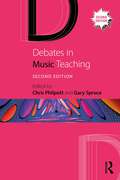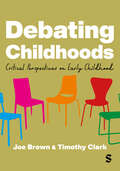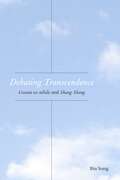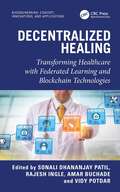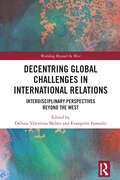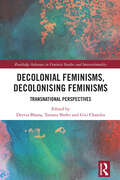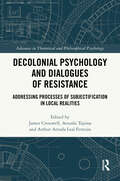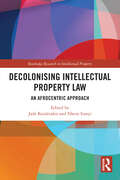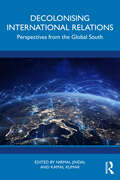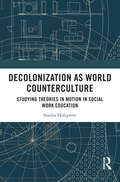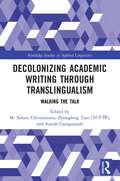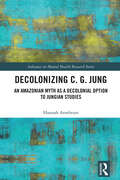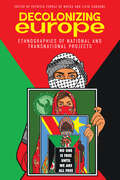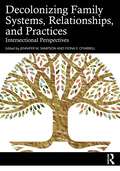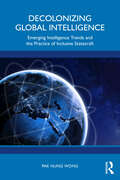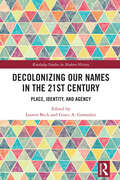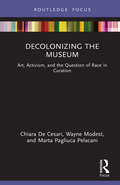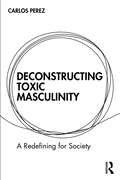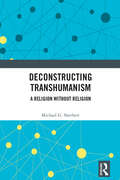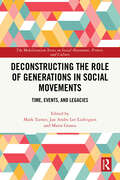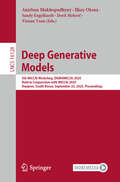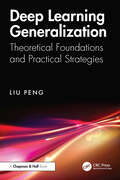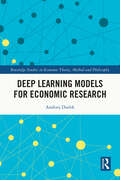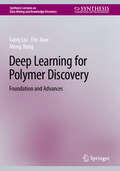- Table View
- List View
Debates in Music Teaching (Debates in Subject Teaching)
by Gary Spruce Chris PhilpottDebates in Music Teaching encourages both graduate and postgraduate students and practising teachers to engage with contemporary issues and developments in music education. It introduces a critical approach to the central concepts and practices that have influenced major interventions and initiatives in music teaching and supports the development of new ways of looking at ideas around teaching and learning in music.Bringing together leading international experts, the chapters consider key issues in music education alongside reflective questions to help shape research and writing. This second edition has been fully updated to reflect the latest debates in the field including: the justification for music in the school curriculum music education and cognitive psychology the nature of musical knowledge addressing decolonisation partnerships in music education the nature of musical development social justice and music education the place of diverse musical genres and traditions in the music curriculum pedagogies of composing environmentally sustainable practices for teaching music with technology the professional journeys and identity of music teachers Written to help readers to form their own personal philosophy of music education and stimulate critical and creative thinking, Debates in Music Teaching is essential reading for all student and practising music teachers.
Debating Childhoods: Critical Perspectives on Early Childhood
by Joe Brown Timothy ClarkThis book aims to challenge dominant narratives of childhood, offering a critical exploration of ten contemporary debates. Authored by experienced professionals and academics in the field, this thought-provoking book examines the impact of these debates on children′s lived experiences through a socio-cultural lens. Bolstered by reflective questions and illustrative case studies, it stimulates discussions on social justice, children′s rights, and their positioning within political and economic contexts. Written for students and professionals, ‘Debating Childhoods’ serves as a catalyst for critical engagement and aims to empower current and future scholars, policymakers, and practitioners to consider their roles in shaping the lives of young children.
Debating Childhoods: Critical Perspectives on Early Childhood
by Joe Brown Timothy ClarkThis book aims to challenge dominant narratives of childhood, offering a critical exploration of ten contemporary debates. Authored by experienced professionals and academics in the field, this thought-provoking book examines the impact of these debates on children′s lived experiences through a socio-cultural lens. Bolstered by reflective questions and illustrative case studies, it stimulates discussions on social justice, children′s rights, and their positioning within political and economic contexts. Written for students and professionals, ‘Debating Childhoods’ serves as a catalyst for critical engagement and aims to empower current and future scholars, policymakers, and practitioners to consider their roles in shaping the lives of young children.
Debating Transcendence: Creatio ex nihilo and Sheng Sheng (Comparative Theology: Thinking Across Traditions)
by Bin SongA bold and rigorous reexamination of transcendence—uniting religion, theology, philosophy, and science—while bridging Confucian and Christian thought to explore the origins of the world and human destiny Debating Transcendence is a groundbreaking contribution to the ongoing dialogue between Confucian and Christian thought by addressing the transcendence debate—a key controversy that has shaped centuries of cross-cultural intellectual exchange. Song examines whether the Confucian concept of Tian (Heaven) or Taiji (Ultimate Limit) possesses a transcendent dimension comparable to Christian understandings of the Creator God. This study revisits the historical and philosophical roots of the debate, tracing its evolution from early interactions between Confucianism and Christianity during the sixteenth century to present-day discussions. At the heart of this book is Song’s aim to construct a Confucian definition of theology and a Confucian approach to comparative theology. Grounded in a scientifically rigorous methodology that transcends the conceptual boundaries of philosophy, religion, and theology, this new approach balances rootedness and impartiality, minimizing biases and revealing shared ground. Covering essential thinkers from the West and the East—such as Plato, Augustine, Descartes, and Paul Tillich alongside Confucius, Laozi, Wang Bi, and Zhu Xi—Song explores the historical development of key concepts such as creatio ex nihilo (creation out of nothing) and sheng sheng (birth birth), challenging misconceptions and highlighting underexplored commonalities and differences. Drawing from his diverse scholarly background and extensive engagement with both traditions, Song distinguishes Confucian from Daoist metaphysics and demonstrates that Confucian metaphysics, centered around the concept of generatio ex nihilo, offers a compelling framework for understanding transcendence that not only resembles but, in certain aspects, surpasses major streams of its Christian counterpart. Readers seeking to understand the profound spiritual foundations underpinning interactions between China and the West will find Song’s work essential. Combining rigor, scope, and depth, Debating Transcendence paves the way for refreshed interactions between Confucian and Christian thought, offering insights vital to contemporary scholarship and interreligious exchange.
Decentralized Healing: Transforming Healthcare with Federated Learning and Blockchain Technologies (Bioengineering)
by Sonali Dhananjay Patil Rajesh Ingle Amar Buchade Vidy PotdarThe convergence of emerging technologies is reshaping industries at an unprecedented pace, and healthcare is no exception. With the rapid digitization of medical records, the proliferation of connected health devices, and the growing need for secure and efficient data management, the healthcare sector faces both immense opportunities and daunting challenges. Among the most promising solutions to these challenges are blockchain technology and federated learning—two revolutionary paradigms that offer a decentralized, privacy-preserving approach to healthcare innovation.Decentralized Healing: Transforming Healthcare with Federated Learning and Blockchain Technologies aims to serve as a comprehensive guide to understanding and implementing these transformative technologies in the healthcare ecosystem. The chapters in this book cover a diverse range of topics, from fundamental concepts and theoretical frameworks to real-world applications and case studies. Readers will gain insights into how federated learning enables collaborative artificial intelligence (AI) training while preserving patient data privacy, how blockchain ensures data integrity, security, and traceability, and how the integration of these technologies can drive innovations in electronic health records, cybersecurity, and decentralized healthcare networks. A major highlight of this book is its focus on practical applications and future trends. Whether you are a healthcare professional, blockchain/AI researcher, policymaker, or industry leader, it offers valuable knowledge and actionable insights into how decentralized approaches can empower patients, improve medical decision-making, and revolutionize global healthcare infrastructures.This book serves as a valuable resource for anyone passionate about the future of healthcare and technology. By embracing decentralized and privacy-preserving solutions, we can pave the way for a more secure, efficient, and patient-centric healthcare system.Let the journey towards decentralized healing begin!
Decentring Global Challenges in International Relations: Interdisciplinary Perspectives Beyond the West (Worlding Beyond the West)
by Debora Valentina Malito Evangelos FanoulisThis book examines contemporary global challenges from a decentring perspective, advancing an interdisciplinary conversation. International studies scholarship has become increasingly more interdisciplinary and multifocal, especially as the escalation of systemic ecological and economic crises, as well as social, and political challenges in the 21st century have required comprehensive ways of thinking and taking stock of existing ontological and epistemic limitations. A decentring approach is crucial to account for how interdependent relations across states and societies, regions and the globe, shape modernity and its global manifestations are, in an era of growing and persistent crises. The book explains why traditional hegemonic approaches to global challenges are problematic, and conceptualises what a decentring approach to global challenges entails: a deconstruction of traditional and sedimented epistemic underpinnings (implying a rethinking of agency, time, geographies, norms, topics, and loci of public attention) but also an appreciation of the mutually constructed nature of the international. This book will appeal to students and scholars of international relations (IR) and international studies who are interested in decentring, as well as those working for civil society organisations (CSOs), NGOs, and think tanks.
Decolonial Feminisms, Decolonising Feminisms: Transnational Perspectives (Routledge Advances in Feminist Studies and Intersectionality)
by Deevia Bhana Giti Chandra Tamara SheferThis book redefines feminist discourse by exploring the intersections of decolonial feminisms across various geopolitical contexts, emphasising the integration of local and indigenous narratives that challenge colonial epistemologies.The volume is organised into three thematic parts that critique traditional feminist frameworks, highlight innovative pedagogical methodologies, and showcase activism aimed at addressing intersectional inequalities. Each section features contributions from established scholars and emerging voices from both the Global North and the Global South, fostering interdisciplinary discussions that reflect a rich diversity of experiences. This approach not only enhances understanding of feminist thought but also promotes transformative practices that advocate for gender and social justice.The book is targeted at scholars, students, and activists in feminist studies, postcolonial theory, and social justice and is a must-read for those looking to expand their understanding of feminist thought. Its emphasis on collaboration and solidarity makes it a valuable resource for anyone interested in addressing the complex global issues influenced by colonial histories while envisioning a more equitable future.
Decolonial Psychology and Dialogues of Resistance: Addressing Processes of Subjectification in Local Realities (Advances in Theoretical and Philosophical Psychology)
by James Cresswell Atsushi Tajima Arthur Arruda Leal FerreiraInterweaving rich theory on dialogism, power, and resistance together with situated scenarios addressing the production of psychological knowledge, this book explores decoloniality as it interfaces with strategic fields in psychology.Current movements in global sentiment have raised important calls for decolonial action. In this volume an international set of authors come together to critically challenge power by considering how colonial mindsets develop and are retained. Drawing on dialogism inspired by Bakhtin, Vygotsky, and other leading thinkers of dialogicality, the book focuses on dialogue and how it is tied to the ability to think in ways outside colonial mindsets. It challenges approaches that run the risk of bypassing how fundamental colonialism has become for human thinking, and incorporates visions to consider how, both conceptually and methodologically, a postcolonial or decolonial psychology can be done. In so doing, it guides readers beyond the status quo to consider a program to improve psychology, formulate a new psychological culture, and bring about discussion beyond the permanent – yet generative – tension between liberating and subordinating psychologies.The book will be key reading for theoretical and critical psychology scholars and postgraduate students, particularly those interested in community engagement and decolonizing psychology. It will also be of interest to those engaged in research in Bakhtian studies, critical theory, and power studies.
Decolonising Intellectual Property Law: An Afrocentric Approach (Routledge Research in Intellectual Property)
by Jade Kouletakis and Nkem ItanyiThis book advocates for an Afrocentric approach to intellectual property (IP) law, using lessons from Nigeria’s past to encourage reform for the future of Africa’s legal IP landscape.Highlighting the Eurocentric influence on the history of intellectual property law in Africa, the book demonstrates how this contradicts traditional African community culture. This book makes the case for legitimising cultural expressions of traditional communities despite the western legal framework within which they exist, reimagining a decolonised IP framework whereby African histories are centred. Questioning the fundamentals of the current IP landscape, such as the concept of eligibility in copyright which developed alongside European technological advances, the book also details the role of the courts in resolving IP disputes. It highlights Africa as a powerhouse of original, autonomous innovation, values, and traditions which predate the West’s concept of intellectual property. It illustrates the African experience of intellectual property from a pro-African perspective as shared by African authors.This book will be of interest to researchers in the field of intellectual property, copyright, and patent law, as well as African law.
Decolonising International Relations: Perspectives from the Global South
by Kamal Kumar Nirmal JindalThis volume critically analyses the theories and concepts of international relations (IR), which will be instrumental in understanding IR from a non-western perspective. Owing to its emphasis on the need to decolonise the discipline of IR, alternate perspectives from the global South have been explored and discussed in detail.The book provides new insights to make the discipline more inclusive, universal and contributory to world peace and security. It lucidly enumerates on the concepts of state, sovereignty, power, conflict, security, diplomacy, human rights, development, market, inequalities, and migration from a non-Eurocentric lens, bringing distinct perspectives and experiences to the fore. Expanding on the Indian foreign policy of Vasudev Kutumbakam, it highlights India’s policy of multi-alliances and multilateralism and, also refers to India’s contributions during the COVID-19 pandemic and its drive to champion the cause of marginalised nations by reforming international institutions and pressing for development with sustainability. It is testament to India’s commitment to global security through cooperation and collective action.This book will be useful to the Departments of Political Science, Global Studies, International Studies, and South Asian studies. It will be an indispensable resource for researchers, social scientists and general readers interested to understand the theories and key concepts of IR, especially from an Indian perspective.
Decolonization as World Counterculture: Studying Theories in Motion in Social Work Education
by Sandra HoltgreveDecolonization as World Counterculture captures the underlying conditions of the rise of post- and decolonial theories by asking how we arrived at this moment when decolonial arguments seem to be everywhere and yet not enough.While efforts to decolonize knowledge and disciplines continue to expand, this book takes a different, theory-reflecting approach. It examines instead how decolonization itself has become a global although unequally addressed phenomenon. Bringing together world culture research with postcolonial studies in the field of social work, the book analyzes social work curricula from Germany, Mexico, and Ecuador to explore how (de)coloniality is embedded in diverging horizons of meanings but shaped by strikingly similar institutions in the educational setting. To this end, the book offers a knowledge sociological view on how decolonization itself is globalized. It mobilizes the neo-institutional approach of world culture to describe the decolonial imperative as “world counterculture,” an integrative frame of otherwise different and diverging social justice agendas. In this way, taking the theoretical premises of decolonization seriously, the book examines the promises and limitations of connecting decolonization with Western theories of globalization.Assembling these distinct pieces of a puzzle spanning different fields, this book is a testimony to the most successful and thriving theoretical views of the last decades in the human and social sciences. It is sure to challenge, fascinate, and inspire readers across the specialist fields of postcolonial studies, the sociology of knowledge, global social theory, and international social work.
Decolonizing Academic Writing through Translingualism: Walking the Talk (Routledge Studies in Applied Linguistics)
by Suresh Canagarajah M. Sidury Christiansen Tian 田中锋 ZhongfengThis collection explores innovative ways to embody translingual practices in academic writing, showcasing how multilingual authors can effectively leverage their linguistic resources in research and publication. Recognizing that traditional academic writing often suppresses multilingual voices, this book advocates for a decolonized approach that embraces diverse linguistic expressions and knowledge representations for social change.This volume features perspectives from scholars across various disciplines and linguistic backgrounds presenting their unique visions of discursive, rhetorical, and linguistic diversity in academic writing. Each chapter showcases its respective author’s critical reflections on their language choices. This book offers a counterpoint to existing literature by making the case for the register known as “academic English” as a form both open to change and possible for accommodating diversity, empowering scholars to negotiate the register’s norms around their own languages and establish spaces for their own unique voices and identities.This book serves as a valuable resource for graduate students, faculty, and scholars interested in academic writing, TESOL, composition studies, language teaching and learning, and applied linguistics.
Decolonizing C. G. Jung: An Amazonian Myth as a Decolonial Option to Jungian Studies (Advances in Mental Health Research)
by Hannah ArmbrustThis book puts forth a “decolonial option” to C. G. Jung’s work as part of a new overview of his thoughts and writings.Challenging traditional Eurocentric views of the psyche, it presents a novel interpretation of Jung’s theories through the concept of archetypal intersubjectivity, Indigenous mythology, and dream analysis based on diatopic hermeneutics. Using myths, and specifically an archetypal story from the Huni Kuin (also known as Kaxinawa) people, it examines how mythic narratives are conceived from an emotionally charged experience and further conceptualizes these narratives as an important psychic archive to help people make sense of raw emotions.A fresh and lively exploration of C. G. Jung’s work, this book will appeal to scholars and students with interests in Indigenous mythologies, Jungian studies, dream analysis, decolonial studies, and depth psychology.
Decolonizing Europe: Ethnographies of National and Transnational Projects
by Patrícia Ferraz de Matos Livio SansoneRevived by the global resonance of the Black Lives Matter movement in 2020, this book adds to the current discussion on the idea of decolonizing Europe. Drawing inspiration from the study of colonialism, postcolonialism and the imperative to decolonize knowledge and practice, the editors bring together a group of scholars approaching these issues through ethnographic inquiry. The volume explores how race, colonial legacies and structural inequality are addressed across diverse European contexts – north, central, eastern and southern – as well as in their entanglements with regions beyond Europe. It offers critical, grounded insights into the possibilities and challenges of decolonial thinking today.
Decolonizing Family Systems, Relationships, and Practices: Intersectional Perspectives
by Jennifer M. Sampson Fiona E. O’FarrellCentering liberation, justice, and cultural wisdom in the heart of relational work, this book provides a comprehensive and integrative examination of human development and the family life cycle through a decolonized, anti‑racist, and intersectional lens.Written by a diverse collection of practitioners, educators, and scholars, tht book challenges the colonial roots of foundational family therapy models and offers bold alternatives that center agency, community, and healing. Chapters discuss essential topics such as family development and stages of the life cycle, relationship norms, gender and sexuality, neurovariance, grief and loss, healing, and more – all while exploring the ways in which systemic inequalities shape the lived experiences of individuals and families from diverse backgrounds. With real‑life stories and perspectives, this book provides essential practical guidance and tools to help mental health practitioners navigate and resist systemic barriers in their work and support an ongoing practice that fosters more inclusive, equitable, and responsive therapeutic relationships.This book offers a new path forward for anyone who wants to practice healing in ways that are culturally affirming, politically conscious, and radically human. It is an essential resource for graduate students and practitioners in mental health programs seeking to develop their skills in working with diverse families.
Decolonizing Global Intelligence: Emerging Intelligence Trends and the Practice of Inclusive Statecraft
by Pak Nung WongFrom September 11 to the calamitous withdrawal of United States troops from Afghanistan, Western intelligence has failed to negotiate the largest military and humanitarian crises across the world. This book proposes to decolonize global intelligence from the peripheries of the Global South and put forward a new intelligence practice of ‘inclusive statecraft’.It shows how dominant Western intelligence systems have failed to protect the very ideas they promised to uphold and the discrepancy between the West’s ‘Responsibility to Protect (R2P)’ liberalist doctrine and the realist on-the-ground complex reality as observed by the ‘Failure to Protect (F2P)’ scholarships. Drawing theoretical insights and empirical (both historical and contemporary) materials from a wide array of case studies of Western and non-Western intelligence settings and practices as well as their interactions, it argues that the next generation of global security and intelligence practitioners will necessitate genuine interracial, non-anthropocentric and cross-cultural inclusivity, especially the capability to take the non-Western intelligence cultures and their realist strategic thoughts seriously.This book will not just add new knowledge to the larger field of security and intelligence studies, but will also pioneer the relatively underdeveloped fields of comparative intelligence cultures, and interstellar intelligence/cultural studies. It will be indispensable for policymakers, bureaucrats and government officials.
Decolonizing Our Names in the 21st Century: Place, Identity, and Agency (Routledge Studies in Modern History)
by Lauren Beck Grace A. GomashieThis book combines different decolonial approaches from around the world to offer a roadmap for updating names and naming practices, restoring and protecting precolonial ones, and reimagining or recontextualizing the relationship between place, identity, and names.In a postcolonial context, naming often serves as a bitter reminder of past harms through commemorative naming practices, whether through a system of baptismal names or a former colony’s approach to dealing with the names that the colonizer left behind. This volume assembles authors who hail from formerly colonized regions of the Americas, Europe, Africa, and Asia to engage with this problem of decolonizing names in the twenty-first century from a global perspective. The book also points to what strategies have had more success than others while envisioning the tools needed for progress in the future.Offering a useful framework with approaches that can easily be used across other geographical contexts, this volume is suitable for scholars and students interested in decolonization, identity, and naming practices.
Decolonizing the Museum: Art, Activism, and the Question of Race in Curation (Museums in Focus)
by Wayne Modest Chiara De Cesari Marta Pagliuca PelacaniThis book asks what it means to decolonize museums in theory and practice. It explores recent calls by activists and artists for social change in and through museums and how museums have responded to these calls and interventions.The point of departure for this volume is the burgeoning global debates around racism that have compelled many museums and public institutions to confront their complicity in colonialism, both past and present. Building on interviews with curators, cultural practitioners, activists, and artists, as well as the authors' ongoing involvement with movements aimed at decolonizing museums, this volume explores how anti-racist activism and artivism have transformed museums, as well as the broader social and political significance of these transformations. The book focuses on the practices, approaches, and strategies that are being adopted in efforts to decolonize museums and cultural institutions, where they succeed and fail, and the similarities and differences between these initiatives. It discusses specific exhibitions and whether they represent colonialism as a past phenomenon or as enduring racial logics forcefully shaping the present. It analyzes both mainstream European museums and grassroots, museum-like initiatives that aim to reckon with colonialism and race in different contexts. Core to the argument is the issue of how memory, heritage, and museum studies, the disciplines that explore, explain, and staff museums, have engaged or not with race.Decolonizing the Museum will be valuable for those studying or researching in the fields of museum studies, heritage, memory and art studies, decolonial theory, postcolonialism, race and racism, and cultural politics. Providing an important window into the political role of curators and the politics of race in transforming museums, it will also be beneficial to museum practitioners and activists and artists with a stake in these institutions.
Deconstructing Toxic Masculinity: A Redefining for Society
by Carlos PerezThis accessible book explores toxic masculinity, looking at how to define it, and how we can and should challenge its spread. This book draws on Derrida’s deconstruction, using the philosophical lens to deconstruct what toxic masculinity means and to better understand its significance for our society. It focuses on how harmful aspects of masculinity spread, infiltrate, and intoxicate our societies and how existing structures allow aspects of harmful masculinity to become toxic. This book also features discussions and analysis of participants’ lived experiences of masculinities, alongside the author’s reflections. It explores the relevance of toxic masculinity in work environments, politics, relationships, and gender roles and seeks to challenge and mitigate its damages for everyone. Encouraging critical thinking and understanding of healthier ways of being for all, this timely book will be of interest to therapists, counselors, teachers, and practitioners of family studies. It will also be useful reading for students in the fields of psychology, gender studies, sociology, and related fields.
Deconstructing Transhumanism: A Religion Without Religion
by Michael G. SherbertDeconstructing Transhumanism: A Religion Without Religion challenges the widely held view that transhumanism—a movement advocating for the enhancement of human life through technology—is purely secular and scientific. Instead, this groundbreaking study reveals how transhumanist thought remains deeply shaped by religious ideas, particularly those rooted in Christianity. Drawing on the philosophy of Jacques Derrida, Michael G. Sherbert explores how religious concepts like the sacred, messianism, salvation, and transcendence quietly persist within transhumanist visions of the future—often without reflection on the potential dangers they carry.From artificial intelligence to the dream of digital immortality, this book uncovers how technological aspirations often mirror age-old religious hopes. Through a careful analysis of leading figures such as Ray Kurzweil, David Pearce, and Nick Bostrom, Sherbert shows that even the most futuristic goals often retain hidden religious structures—what Derrida calls a “religion without religion.”Spanning philosophical inquiry, ethical reflection, and cultural critique, Deconstructing Transhumanism invites readers to rethink the assumptions behind some of today’s most influential ideas about technology, progress, and the future. It offers a timely examination of the religious undercurrents shaping Western technological imaginaries—urging greater awareness of the powerful, and sometimes perilous, narratives we carry into our increasingly high-tech future.
Deconstructing the Role of Generations in Social Movements: Time, Events, and Legacies (The Mobilization Series on Social Movements, Protest, and Culture)
by Maria Grasso Mark Turner Jan Andre Lee LudvigsenAlthough questions of how a social group’s shared experiences growing up in particular historical and social contexts shapes their identities, including their political identities, have engaged sociologists of family, youth, citizenship, culture, and political change, few books have so far examined the specific role of generations and generational consciousness in social movement activism. As such, this is the first book to focus exclusively on issues of temporality, events, and generational legacies in social movements. In demonstrating how generational consciousness, and specific frames, narratives, and repertoires of contention are shaped by, and respond to, historical and contemporary meanings of major events and social transformations in different locations, new important questions on race, class, ethnicity, gender, sexuality, and citizenship are revealed at new, emerging critical junctures in the twenty-first century,With its high-quality chapters and transnational scope, this book will capture several key trends in the role of generations in social movements and explores topics including contemporary feminism, family, and intergenerational transmission, generationality and political change, rituals and social change, and Black politics and US democracy.This is an invaluable resource for students and academics with an interest in sociology, political science, and the study of social movements and social change, and for policymakers and readers with a general interest in intergenerational conflict and the challenges of engaging new youth generations in political and democratic structures and processes.
Deep Generative Models: 5th MICCAI Workshop, DGM4MICCAI 2025, Held in Conjunction with MICCAI 2025, Daejeon, South Korea, September 23, 2025, Proceedings (Lecture Notes in Computer Science #16128)
by Anirban Mukhopadhyay Sandy Engelhardt Ilkay Oksuz Yixuan Yuan Dorit MehrofThis book constitutes the proceedings of the 5th Workshop on Deep Generative Models for Medical Image Computing and Computer Assisted Intervention, DGM4MICCAI 2025, held in conjunction with the 28th International Conference on Medical Image Computing and Computer Assisted Intervention, MICCAI 2025, in Daejeon, South Korea, during September 2025.The 33 papers presented in this book were carefully reviewed and selected from 50 submissions. These papers deal with recent algorithmic developments, new results, and promising future directions in Deep Generative Models.
Deep Learning Generalization: Theoretical Foundations and Practical Strategies
by Liu PengThis book provides a comprehensive exploration of generalization in deep learning, focusing on both theoretical foundations and practical strategies. It delves deeply into how machine learning models, particularly deep neural networks, achieve robust performance on unseen data. Key topics include balancing model complexity, addressing overfitting and underfitting, and understanding modern phenomena such as the double descent curve and implicit regularization.The book offers a holistic perspective by addressing the four critical components of model training: data, model architecture, objective functions, and optimization processes. It combines mathematical rigor with hands-on guidance, introducing practical implementation techniques using PyTorch to bridge the gap between theory and real-world applications. For instance, the book highlights how regularized deep learning models not only achieve better predictive performance but also assume a more compact and efficient parameter space. Structured to accommodate a progressive learning curve, the content spans foundational concepts like statistical learning theory to advanced topics like Neural Tangent Kernels and overparameterization paradoxes.By synthesizing classical and modern views of generalization, the book equips readers to develop a nuanced understanding of key concepts while mastering practical applications.For academics, the book serves as a definitive resource to solidify theoretical knowledge and explore cutting-edge research directions. For industry professionals, it provides actionable insights to enhance model performance systematically. Whether you're a beginner seeking foundational understanding or a practitioner exploring advanced methodologies, this book offers an indispensable guide to achieving robust generalization in deep learning.
Deep Learning Models for Economic Research (Routledge Studies in Economic Theory, Method and Philosophy)
by Andrzej DudekIn today’s data-driven world, the ability to make sense of complex, high-dimensional datasets is crucial for economists and data scientists. Traditional quantitative methods, while powerful, often struggle to keep up with the complexities of modern economic challenges. This book bridges this gap, integrating cutting-edge machine learning techniques with established economic analysis to provide new, more accurate insights.The book offers a comprehensive approach to understanding and applying neural networks and deep learning models in the context of conducting economic research. It starts by laying the groundwork with essential quantitative methods such as cluster analysis, regression, and factor analysis, then demonstrates how these can be enhanced with deep learning techniques like recurrent neural networks (RNNs), convolutional neural networks (CNNs), and transformers. By guiding readers through real-world examples, complete with Python code and access to datasets, it showcases the practical benefits of neural networks in solving complex economic problems, such as fraud detection, sentiment analysis, stock price forecasting, and inflation factor analysis. Importantly, the book also addresses critical concerns about the “black box” nature of deep learning, offering interpretability techniques like Local Interpretable Model-agnostic Explanations (LIME) and SHapley Additive exPlanations (SHAP) to demystify model predictions.The book is essential reading for economists, data scientists, and professionals looking to deepen their understanding of AI’s role in economic modeling. It is also an accessible resource for non-experts interested in how machine learning is transforming economic analysis.
Deep Learning for Polymer Discovery: Foundation and Advances (Synthesis Lectures on Data Mining and Knowledge Discovery)
by Gang Liu Meng Jiang Eric InaeThis book presents a comprehensive range of topics in deep learning for polymer discovery, from fundamental concepts to advanced methodologies. These topics are crucial as they address critical challenges in polymer science and engineering. With a growing demand for new materials with specific properties, traditional experimental methods for polymer discovery are becoming increasingly time-consuming and costly. Deep learning offers a promising solution by enabling rapid screening of potential polymers and accelerating the design process. The authors begin with essential knowledge on polymer data representations and neural network architectures, then progress to deep learning frameworks for property prediction and inverse polymer design. The book then explores both sequence-based and graph-based approaches, covering various neural network types including LSTMs, GRUs, GCNs, and GINs. Advanced topics include interpretable graph deep learning with environment-based augmentation, semi-supervised techniques for addressing label imbalance, and data-centric transfer learning using diffusion models. The book aims to solve key problems in polymer discovery, including accurate property prediction, efficient design of polymers with desired characteristics, model interpretability, handling imbalanced and limited labeled data, and leveraging unlabeled data to improve prediction accuracy.
